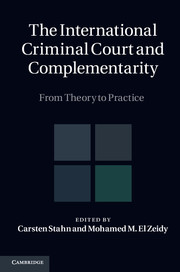Book contents
- Frontmatter
- Contents
- Acknowledgments
- Foreword by HE Judge Sang-Hyun Song
- Foreword by Patricia O’Brien
- Foreword by Silvia A. Fernandez de Gurmendi
- List of abbreviations
- Introduction: bridge over troubled waters?
- PART I General reflections
- PART II Origin and genesis of complementarity
- PART III Analytical dimensions of complementarity
- PART IV Interpretation and application
- PART IV (Continued) Interpretation and application
- 21 States’ obligations to investigate and prosecute perpetrators of international crimes: the perspective of the European Court of Human Rights
- 22 The law and policy of complementarity in relation to ‘criminal proceedings’ carried out by non-state organized armed groups
- 23 Complementarity and the crime of aggression
- 24 Complementarity and alternative forms of justice
- 25 Complementarity and ‘reverse cooperation’
- 26 In the hands of the state: implementing legislation and complementarity
- PART V Complementarity in perspective
- PART VI Complementarity in practice
- Index
- References
26 - In the hands of the state: implementing legislation and complementarity
from PART IV (Continued) - Interpretation and application
Published online by Cambridge University Press: 05 November 2014
- Frontmatter
- Contents
- Acknowledgments
- Foreword by HE Judge Sang-Hyun Song
- Foreword by Patricia O’Brien
- Foreword by Silvia A. Fernandez de Gurmendi
- List of abbreviations
- Introduction: bridge over troubled waters?
- PART I General reflections
- PART II Origin and genesis of complementarity
- PART III Analytical dimensions of complementarity
- PART IV Interpretation and application
- PART IV (Continued) Interpretation and application
- 21 States’ obligations to investigate and prosecute perpetrators of international crimes: the perspective of the European Court of Human Rights
- 22 The law and policy of complementarity in relation to ‘criminal proceedings’ carried out by non-state organized armed groups
- 23 Complementarity and the crime of aggression
- 24 Complementarity and alternative forms of justice
- 25 Complementarity and ‘reverse cooperation’
- 26 In the hands of the state: implementing legislation and complementarity
- PART V Complementarity in perspective
- PART VI Complementarity in practice
- Index
- References
Summary
This chapter discusses the link between complementarity and national implementing legislation. It focuses on the correlation between states’ expectations and the adoption of variant national views on complementarity. Through an overview of different state approaches that facilitate, obstruct or reinterpret complementarity, the chapter argues that implementing legislation offers an effective typology of complementarity which in turn provides good insight into how states, upon whose actions or inactions the system is based, appreciate the principle and its ramifications in practice.
Introduction
Complementarity has a key role to play in the regime created by the Rome Statute for the International Criminal Court. A vital concept for the effective functioning of the Court, complementarity was one of the thorniest issues faced by those who designed this permanent institution and continues to hold a special place in the Statute as it regulates the Court's relationship with national legal orders.
At its inception, complementarity was chosen as a means of determining which forum will assume jurisdiction over a particular case. The product of a compromise that emerged in the negotiations for the establishment of the International Criminal Court (‘ICC’), complementarity serves a delicate balance between the competing interests of state sovereignty and judicial independence, without which the Court would not have materialized.
- Type
- Chapter
- Information
- The International Criminal Court and ComplementarityFrom Theory to Practice, pp. 830 - 852Publisher: Cambridge University PressPrint publication year: 2011
References
- 3
- Cited by



